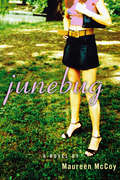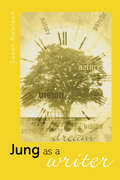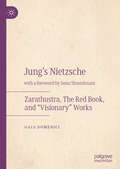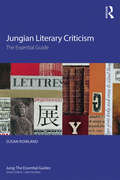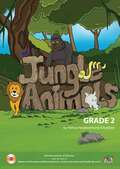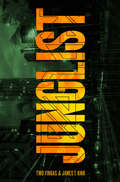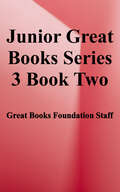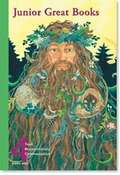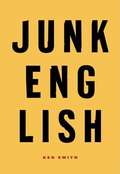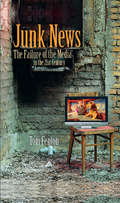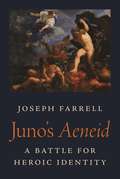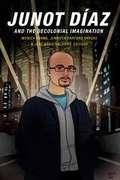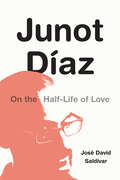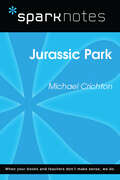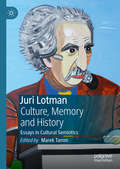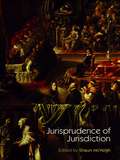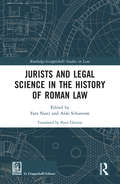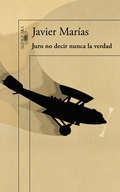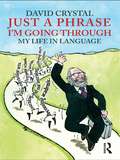- Table View
- List View
Junebug
by Maureen Mccoy"I was raised zero-parent," says hormone-addled 17-year-old Junebug Host, "what the newspapers call it when your mother is in prison and the father was just a sperm."Junebug has been visiting her mother in Ellisville Reformatory for Women ever since she was five years-old, when beauty queen Theresa Host calmly stepped out of their trailer with an axe and inexplicably bludgeoned a neighbor to death. But during the summer of Junebug's high school graduation--and the summer of her first wildly passionate affair--with a snake-smooth greaser 20 years her senior--Theresa reels in her oversexed daughter, and shatters her world, by suddenly announcing the motive she had kept to herself since the day of the murder: an act of vengeance for a crime in which Junebug was intimately involved. "I did it for you," she tells Junebug, who is thrown into a ferment of memory and guilt.Set in the outsized landscape of far-western Nebraska, a nebulous region little known in contemporary fiction, and peopled by characters whose extreme individuality is exceeded only by their eccentricity--born again Fundamentalist snake charmers, housewives making ends meet with phone sex 900-number businesses, a 300-pound New Age priestess and the traveling meat salesman who worships her, as well as the all-female inmate population of the Ellisville Reformatory, Junebug is a novel with the intensity of the mother/daughter bond itself, with all its wildness, tragedy and depth.Maureen McCoy is the author of three previous novels, Diving Blood, Summertime, and Walking After Midnight (Poseiden/Simon & Schuster). She received her MFA from the Writers Workshop, University of Iowa, and is a Professor of English at Cornell. Among her many awards are the James Michener Award, the Wurlitzer Foundation Award, and the Albert Schweitzer Fellowship in the Humanities, chosen by Toni Morrison.
Jung as a Writer
by Susan RowlandJung as a Writer traces a relationship between Jung and literature by analysing his texts using the methodology of literary theory. This investigation serves to illuminate the literary nature of Jung’s writing in order to shed new light on his psychology and its relationship with literature as a cultural practice. Jung employed literary devices throughout his writing, including direct and indirect argument, anecdote, fantasy, myth, epic, textual analysis and metaphor. Susan Rowland examines Jung’s use of literary techniques in several of his works, including Anima and Animus, On the Nature of the Psyche, Psychology and Alchemy and Synchronicity and describes Jung’s need for literature in order to capture in writing his ideas about the unconscious. Jung as a Writer succeeds in demonstrating Jung’s contribution to literary and cultural theory in autobiography, gender studies, postmodernism, feminism, deconstruction and hermeneutics and concludes by giving a new culturally-orientated Jungian criticism. The application of literary theory to Jung’s works provides a new perspective on Jungian Psychology that will be of interest to anyone involved in the study of Jung, Psychoanalysis, literary theory and cultural studies.
Jung's Nietzsche: Zarathustra, The Red Book, and “Visionary” Works
by Gaia DomeniciThis book explores C.G. Jung's complex relationship with Friedrich Nietzsche through the lens of the so-called 'visionary' literary tradition. The book connects Jung's experience of the posthumously published Liber Novus (The Red Book) with his own (mis)understanding of Nietzsche's Zarathustra, and formulates the hypothesis of Jung considering Zarathustra as Nietzsche's Liber Novus –– both works being regarded by Jung as 'visionary' experiences. After exploring some 'visionary' authors often compared by Jung to Nietzsche (Goethe, Hölderlin, Spitteler, F. T. Vischer), the book focuses upon Nietzsche and Jung exclusively. It analyses stylistic similarities, as well as explicit references to Nietzsche and Zarathustra in Liber Novus, drawing on Jung's annotations in his own copy of Zarathustra. The book then uses Liber Novus as a prism to contextualize and understand Jung's five-year seminar on Zarathustra: all the nuances of Jung's interpretation of Zarathustra can be fully explained, only when compared with Liber Novus and its symbology. One of the main topics of the book concerns the figure of 'Christ' and Nietzsche's and Jung's understandings of the 'death of God.'
Jungian Literary Criticism: The Essential Guide (Jung: The Essential Guides)
by Susan RowlandIn Jungian Literary Criticism: the essential guide, Susan Rowland demonstrates how ideas such as archetypes, the anima and animus, the unconscious and synchronicity can be applied to the analysis of literature. Jung’s emphasis on creativity was central to his own work, and here Rowland illustrates how his concepts can be applied to novels, poetry, myth and epic, allowing a reader to see their personal, psychological and historical contribution. This multidisciplinary and transdisciplinary approach challenges the notion that Jungian ideas cannot be applied to literary studies, exploring Jungian themes in canonical texts by authors including Shakespeare, Jane Austen and W. B. Yeats as well as works by twenty-first century writers, such as in digital literary art. Rowland argues that Jung’s works encapsulate realities beyond narrow definitions of what a single academic discipline ought to do, and through using case studies alongside Jung’s work she demonstrates how both disciplines find a home in one another. Interweaving Jungian analysis with literature, Jungian Literary Criticism explores concepts from the shadow to contemporary issues of ecocriticism and climate change in relation to literary works, and emphasises the importance of a reciprocal relationship. Each chapter concludes with key definitions, themes and further reading, and the book encourages the reader to examine how worldviews change when disciplines combine. The accessible approach of Jungian Literary Criticism: the essential guide will appeal to academics and students of literary studies, Jungian and post-Jungian studies, literary theory, environmental humanities and ecocentrism. It will also be of interest to Jungian analysts and therapists in training and in practice.
Jungle Animals class 2 - MIE
by Hélina Hookoomsing-Dookhee"Jungle Animals" is a vibrant and engaging big book designed for Grade 2 students, aiming to enhance English literacy skills. The book takes young readers on a vivid exploration of the lively jungle, introducing a variety of captivating animals through descriptive verses and colorful illustrations. From the gentle elephant using its trunk to the playful monkeys swinging in the trees, each page unfolds with different creatures showcasing their distinct characteristics. As the narrative progresses, children encounter diverse jungle inhabitants like the graceful giraffe, slumbering parrots, and the roaring jungle cats – lions, tigers, and leopards. Through interactive sessions, including pre-reading discussions, story readings, and post-reading activities, the book encourages active participation, vocabulary enrichment, and imaginative role-playing, fostering an enjoyable and educational experience for Grade 2 pupils while linking the narrative to their English curriculum.
Junglist
by Two Fingas James KirkBack in print after more than twenty years, this cult classic of underground British fiction tells the story of young Black men coming of age among the raves and jungle music of London in the 1990s.Back in print after two decades, Junglist tells the compelling, comic, stream-of-consciousness story of four young Black men coming of age among the raves and Jungle music scene in London during the 1990s.Layered with poetic verse, prose and humour, this cult classic of underground British fiction documents the rollercoaster ride of a weekend spent raving during Jungle&’s cultural takeover in the summer of 1994. Jungle, with its booming basslines and Jamaican patois, burst from the pirate radio stations and mixtapes into cavernous clubs, pulling a generation of Black British ravers with it.Originally written as a way to document street culture as it became a feature of London, charting a time when working-class kids, both Black and white, merged to dance as "one family", Junglist is both a testament to Black British sound system culture and a rawthentic account of inner-city life.
Junior Great Books (Series 3 #2)
by Great Books Foundation StaffJunior Great Books Series 3 introduces students to outstanding, interpretive literature from around the world. Book Two of Series 3 features nine stories by award-winning authors. These stories are organized around three themes: gratitude, courage, and cleverness.
Junior Great Books: Book One
by Great Books Foundation StaffSeries 4, Book One Student Edition (2014)
Junk English
by Ken Smith"Language atrocities infest present-day English. To survey the damage, Ken Smith has subjected himself to an unprecedented barrage of mindless jargon, euphemisms, and weasel words, cataloging for inspection and ridicule monstrosities such as impactful and smartize, empty rhetoric such as quality of life and revolutionary in nature, and broad swaths of modern-day grammatical humbug such as Artificial Vocabulary, Parasitic Intensifiers, Useless Cabooses, and Hyphen-Monsters." "With hundreds of examples pulled from everyday life, Junk English shows how our language is becoming so pliable and flabby that the more we read and hear, the less we know."--BOOK JACKET.Title Summary field provided by Blackwell North America, Inc. All Rights Reserved
Junk News
by Tom FentonIn this salient critique of the American media, veteran journalist Tom Fenton exposes the dangerous failings of our news organizations and the fundamental problems with how they present world news. Junk News is a stirring call to reform the faltering "fourth estate" and to take the blinders off our citizens for the sake of our security.Tom Fenton is a four-time Emmy Award-winning journalist and was the senior foreign correspondent for CBS News. He is the author of Bad News: The Decline of Reporting, the Business of News, and the Danger to Us All. He currently works as a BBC commentator.
Juno's Aeneid: A Battle for Heroic Identity (Martin Classical Lectures #36)
by Joseph FarrellA major new interpretation of Vergil's epic poem as a struggle between two incompatible versions of the Homeric heroThis compelling book offers an entirely new way of understanding the Aeneid. Many scholars regard Vergil's poem as an attempt to combine Homer’s Iliad and Odyssey into a single epic. Joseph Farrell challenges this view, revealing how the Aeneid stages an epic contest to determine which kind of story it will tell—and what kind of hero Aeneas will be.Farrell shows how this contest is provoked by the transgressive goddess Juno, who challenges Vergil for the soul of his hero and poem. Her goal is to transform the poem into an Iliad of continuous Trojan persecution instead of an Odyssey of successful homecoming. Farrell discusses how ancient critics considered the flexible Odysseus the model of a good leader but censured the hero of the Iliad, the intransigent Achilles, as a bad one. He describes how the battle over which kind of leader Aeneas will prove to be continues throughout the poem, and explores how this struggle reflects in very different ways on the ethical legitimacy of Rome’s emperor, Caesar Augustus.By reframing the Aeneid in this way, Farrell demonstrates how the purpose of the poem is to confront the reader with an urgent decision between incompatible possibilities and provoke uncertainty about whether the poem is a celebration of Augustus or a melancholy reflection on the discontents of a troubled age.
Junot Díaz and the Decolonial Imagination
by José David Saldívar Jennifer Harford Vargas Monica HannaThe first sustained critical examination of the work of Dominican-American writer Junot Díaz, this interdisciplinary collection considers how Díaz's writing illuminates the world of Latino cultural expression and trans-American and diasporic literary history. Interested in conceptualizing Díaz's decolonial imagination and his radically re-envisioned world, the contributors show how his aesthetic and activist practice reflect a significant shift in American letters toward a hemispheric and planetary culture. They examine the intersections of race, Afro-Latinidad, gender, sexuality, disability, poverty, and power in Díaz's work. Essays in the volume explore issues of narration, language, and humor in The Brief Wondrous Life of Oscar Wao, the racialized constructions of gender and sexuality in Drown and This Is How You Lose Her, and the role of the zombie in the short story "Monstro." Collectively, they situate Díaz's writing in relation to American and Latin American literary practices and reveal the author's activist investments. The volume concludes with Paula Moya's interview with Díaz.Contributors: Glenda R. Carpio, Arlene Dávila, Lyn Di Iorio, Junot Díaz, Monica Hanna, Jennifer Harford Vargas, Ylce Irizarry, Claudia Milian, Julie Avril Minich, Paula M. L. Moya, Sarah Quesada, José David Saldívar, Ramón Saldívar, Silvio Torres-Saillant, Deborah R. Vargas
Junot Díaz: On the Half-Life of Love
by José David SaldívarIn Junot Díaz: On the Half-Life of Love, José David Saldívar offers a critical examination of one of the leading American writers of his generation. He explores Díaz’s imaginative work and the diasporic and immigrant world he inhabits, showing how his influences converged in his fiction and how his writing—especially his Pulitzer Prize--winning novel The Brief Wondrous Life of Oscar Wao—radically changed the course of US Latinx literature and created a new way of viewing the decolonial world. Saldívar examines several aspects of Díaz’s career, from his vexed relationship to the literary aesthetics of Whiteness that dominated his MFA experience and his critiques of the colonialities of power, race, and gender in culture and societies of the Dominican Republic, United States, and the Américas to his use of the science-fiction imaginary to explore the capitalist zombification of our planet. Throughout, Saldívar shows how Díaz’s works exemplify the literary currents of the early twenty-first century.
Jurassic Park (SparkNotes Literature Guide Series)
by SparkNotesJurassic Park (SparkNotes Literature Guide) by Michael Crichton Making the reading experience fun! Created by Harvard students for students everywhere, SparkNotes is a new breed of study guide: smarter, better, faster. Geared to what today's students need to know, SparkNotes provides: *Chapter-by-chapter analysis *Explanations of key themes, motifs, and symbols *A review quiz and essay topicsLively and accessible, these guides are perfect for late-night studying and writing papers
Juri Lotman - Culture, Memory and History: Essays in Cultural Semiotics
by Marek TammThis volume brings together a selection of Juri Lotman’s late essays, published between 1979 and 1995. While Lotman is widely read in the fields of semiotics and literary studies, his innovative ideas about history and memory remain relatively unknown. The articles in this volume, most of which are appearing in English for the first time, lay out Lotman’s semiotic model of culture, with its emphasis on mnemonic processes. Lotman’s concept of culture as the non-hereditary memory of a community that is in a continuous process of self-interpretation will be of interest to scholars working in cultural theory, memory studies and the theory of history.
Jurisprudence of Jurisdiction
by Shaun McVeighFor much of the history of the western legal order, jurisdiction has been the first question of law. This book investigates the difference that jurisdiction continues to make to the ordering of normative existence. It also follows the speculation that without an account of jurisdiction, jurisprudence would be left speechless, with no power to address the conditions of attachment to legal and political order. The starting point of this book lies with the claim that a sharper focus can be given to normative legal ordering through questions of jurisdiction than can be through those of moral responsibility or social action. This is so because jurisdiction articulates both the potentiality of law and the conditions of its exercise. It provides the idiom of response to the fact that there is law and to the fact that law institutes, judges and addresses a form of life. From this viewpoint the contributors to this book examine the institution of human rights, the new global and national orders of sovereign power and of trade and information, the judgment and government of death and desire, and the address of colonial and post-colonial legal idioms. In doing this the contributors also provide for the elaboration of questions of jurisdiction as part of the resources and repertoires of jurisprudence. This book provides a point of entry to an emergent genre of writing within doctrinal, historical and critical jurisprudence that has returned to questions of jurisdiction to think again about juridical order and change. In so doing, it also points to questions that must be asked for there to be any interdisciplinary study that addresses law.
Jurists and Legal Science in the History of Roman Law (Routledge-Giappichelli Studies in Law)
by Fara NastiThis book provides a new approach to the study of the History of Roman Law. It collects the first results of the European Research Council Project, Scriptores iuris Romani - dedicated to a new collection of the texts of Roman jurisprudence, highlighting important methodological issues, together with innovative reconstructions of the profiles of some ancient jurists and works. Jurists were great protagonists of the history of Rome, both as producers and interpreters of law, since the Republican Age and as collaborators of the principes during the Empire. Nevertheless, their role has been underestimated by modern historians and legal experts for reasons connected to the developments of Modern Law in England and in Continental Europe. This book aims to address this imbalance. It presents an advanced paradigm in considering the most important aspects of Roman law: the Justinian Digesta, and other juridical late antique anthologies. The work offers an historiographic model which overturns current perspectives and makes way for a different path for legal and historical studies. Unlike existing literature, the focus is not on the Justinian Codification, but on the individualities of ancient Roman Jurists. As such, it presents the actual legal thought of its experts and authors: the ancient iuris prudentes. The book will be of interest to researchers and academics in Classics, Ancient History, History of Law, and contemporary legal studies.
Juro no decir nunca la verdad
by Javier MaríasTras el éxito de Así empieza lo malo (Libro del Año según Babelia), el nuevo libro de artículos de una voz siempre indispensable y brillante. «Quien no lea a Marías está condenado.»The Nation Este volumen reúne los noventa y cinco artículos publicados por Javier Marías en el suplemento dominical El País Semanal entre el 10 de febrero de 2013 y el 1 de febrero de 2015. En opinión del autor, «nos encontramos en una situación de emergencia que obliga a mancharse con la suciedad que esparcen nuestros gobernantes de todo signo. Cuando los abusos no son la excepción, sino la regla; cuando no se da abasto a contrarrestar -qué digo: a señalar- los desmanes y tropelías, entonces no hay más remedio que emporcarse. Ningún combate se libra desde el tendido. [...] Qué más quisiera yo que mirar desde el tendido con aprobación y complacencia, y no soliviantarme con las noticias de cada mañana.» Las piezas recogidas en Juro no decir nunca la verdad conforman una crónica del periodo, no sólo política -pese a que la impotencia y el hartazgo del ciudadano común están omnipresentes, así como las dolorosas consecuencias de la crisis y la falacia de la recuperación económica-, sino también social y cultural: los estúpidos hábitos originados por el uso de las nuevas tecnologías, el lamentable estado de la cultura en España, el cine y la literatura, los excéntricos regalos bélicos de su amigo Pérez-Reverte, los comportamientos incívicos, el adiós a algunos seres queridos y las falsedades interesadas sobre los intelectuales son otros de los temas tratados. En suma, en este libro Javier Marías ofrece una fiel instantánea de la realidad llena de agudeza e ironía. Y nos brinda el impulso y las claves necesarias para pensar por nuestra cuenta en el tiempoen el que vivimos. Reseñas:«Su mente es profunda, aguda, a veces turbadora, a veces hilarante, y siempre inteligente.»Edward St Aubyn, The New York Times Book Review «Las piezas recogidas en Juro no decir nunca la verdad conforman una crónica del periodo, no sólo política sino social y cultural.»Luis Alonso Girgado, Diario de Arousa
Just A Phrase I'm Going Through: My Life in Language
by David CrystalKidnapping, attempted assassination, espionage … not the answers you’d expect to the question ‘what happens when you become a linguist?’ But now, reflecting on a long and hugely successful career at the forefront of the field of English Language and Linguistics, David Crystal answers this question and offers us a special look behind the scenes at the adventures, rewards, challenges and pitfalls of his life in language. Both an autobiography and a highly accessible introduction to the field of linguistics, Just a Phrase I’m Going Through illuminates and entertains us with its many insights into the ever-fascinating subject of language. David Crystal is synonymous with language, both as a great populariser and linguistic pioneer, and his contribution to the field is unparalleled. This is a book not just for students and teachers but for all lovers of language. For more about David Crystal at Routledge, visit: www.routledge.com/textbooks/9780415485746.
